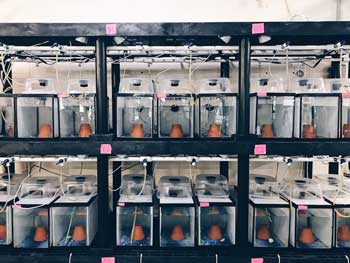How Curious is That Octopus? MBL Project Documents Lives, Behaviors of Cephalopods

Eric Edsinger needed 21 security cameras, not for a super top-secret project, but to get a glimpse into the lives of octopuses. Edsinger, a research fellow at the Marine Biological Laboratory (MBL), is developing a platform to observe and analyze the complex behaviors of cephalopods (octopus, squid, and cuttlefish) throughout their lifespans.
Each camera is suspended above an octopus tank in the MBL’s Marine Resources Center and monitors the behavior of the tentacled occupant day and night. The cameras constantly stream videos to the cloud; each week, a time-lapse video with 30- to 120-second intervals is downloaded to a computer.
For his initial experiment, Edsinger is video-tracking 21 California Two-Spot Octopuses (O. bimaculoides) for four months. This species was the first cephalopod genome to be fully sequenced in 2015 by an international team that included Caroline Albertin, now an MBL Hibbitt Fellow, and Edsinger.
 The 21 octopuses in individual tanks are videotaped night and day; new data analysis tools to identify behaviors are in development.
The 21 octopuses in individual tanks are videotaped night and day; new data analysis tools to identify behaviors are in development. The 21 "Octocam" octopuses were hatched in May and cultured for one month in tanks either with or without hiding places, before being separated into individual tanks. Each tank has an area where the octopus can see the outside world and an area that is blocked from view of other tanks. Edsinger’s initial quest is to see how their early upbringing might affect their social and other behaviors over time.
Even after just one day of monitoring the 21 octopuses, Edsinger will generate more than 15,000 images. To analyze the plethora of data, Edsinger is collaborating with Greg Gage of Backyard Brains, who is developing video analysis tools to study organismal behavior; and Brandon Weissbourd of Caltech, an MBL Whitman Center Research Awardee.
Once the monitoring system is optimized, Edsinger and other investigators can ask a myriad of questions. When are the octopuses more active? How do they interact with one another or with people?
“It’s really easy to collect large amounts of data simply [with this system],” he says. “I know we can scale up and do more interesting behavioral work.”

Ultimately, Edsinger plans to monitor pygmy squid because of its short lifespan (4-6 months, as compared with 14 months for O. bimaculoides). “If a cephalopod has a 4-6 month lifespan, we could get lifespan behavioral datasets,” Edsinger says. He will also monitor the pygmy octopus, one of the smallest octopuses that may be ideal for research on brain and behavior.
“This system is an engineering and behavioral research experiment effort of all of us,” says Edsinger. Current collaborators among MBL staff include: Katie Dever (culturing and tank design), John Carr, Jerome Girard, and Dan Calzarette (design and engineering of seawater and electrical systems), Dave Remsen (video support), and MBL summer interns Jonathan Marvel-Zuccola and Joy Miao (design/build of project website), Peter Newstein and Malaika Cordeiro (building the system, octopus care, website assistance).
While observing octopuses may seem like a game of hide and seek, long-term monitoring can reveal much about the complex behaviors and lifestyles of these unique organisms.